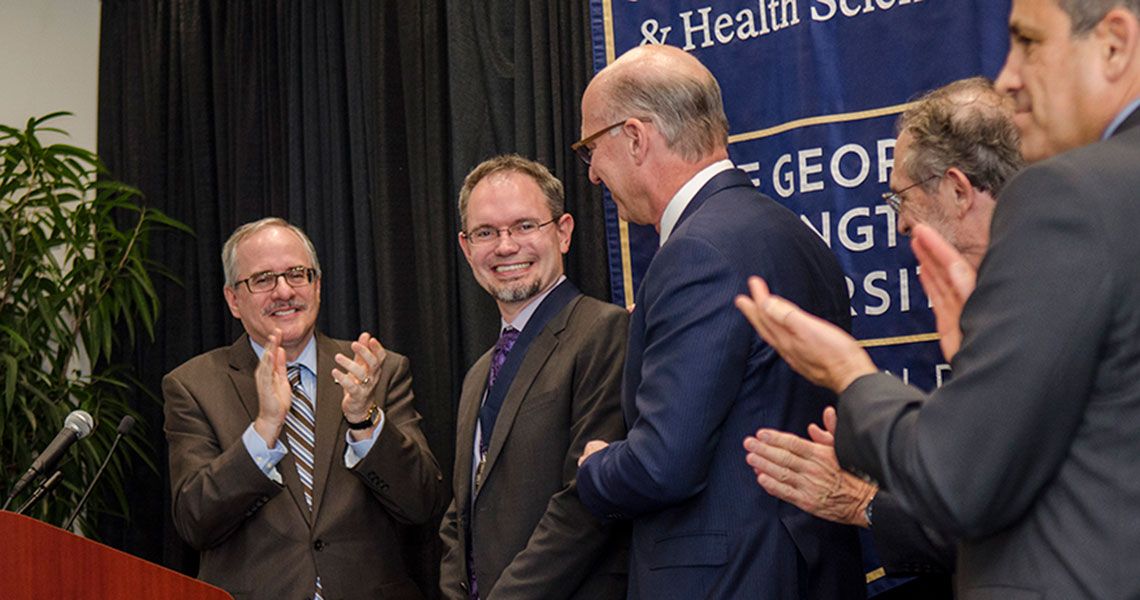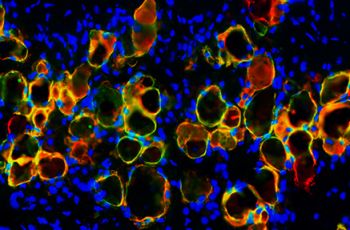Sangeeta, Ramesh, Asha. Those are names of children whose lives were restored thanks to the efforts of global mental health expert Brandon Kohrt, MD, PhD, RESD ’13, associate professor of psychiatry and behavioral sciences at the George Washington University (GW) School of Medicine and Health Sciences (SMHS).
Kohrt shared their stories during his installment as the Charles and Sonia Akman Professor in Global Psychiatry, and they reflect the positive impact he has made on global mental health care.
“We are all part of the George Washington University because of the dedication to improving the quality of the human experience and to reducing human suffering through research, education, and service,” Kohrt said. “I am deeply grateful … for the opportunity to pursue this mission to its fullest extent.”
The endowed fund was made in memory of the parents of Leonard C. Akman, MD ’43, a pioneer in heart transplantation and cardiac catheterization and cousin to Jeffrey S. Akman, MD ’81, RESD ’85, vice president for health affairs, Walter A. Bloedorn Professor of Administrative Medicine, and dean of SMHS.
When Leonard Akman passed away, he left SMHS a $3.2 million gift to support a variety of initiatives, the choosing of which he left to his cousin. “[Leonard] was not really well known to me until 1977, when he showed up at our home to give me the microscope that I would need to begin medical school, that special gift … would symbolize the beginning of a special relationship that Leonard and I would have with GW and as medical school alumni,” Akman said.
Akman also remarked on the importance of the installation for his family, refugees who fled Russia and came to the United States in the late-1800s to escape anti-Jewish rioting in that country. “What is the experience of the refugee, traumatically uprooted from one’s life, family, and belongings? What is the experience of these individuals and families who arrive in a new country or continent that might accept them or not,” Akman asked.
He added that under the leadership of James L. Griffith, MD, chair of the Department of Psychiatry and Behavioral Sciences and Leon M. Yochelson Professor of Psychiatry at SMHS, the GW Department of Psychiatry and Behavioral Sciences is a leader in addressing such issues and “creating a psychiatric workforce skilled in dealing with these challenges and treating their consequences.” That workforce now incudes Kohrt, whom Akman helped to recruit to GW.
In addition to Akman’s remarks, GW President Thomas LeBlanc spoke about the tradition and importance of endowed professorships, adding that Kohrt “is a worthy recipient of this great honor.”
Forrest Maltzman, provost and executive vice president for academic affairs at GW, echoed those words, telling those gathered for the ceremony about the groundbreaking work of the internationally recognized global mental health expert.
Kohrt has worked on mental health in Nepal since 1996, and as an adviser to the Transcultural Psychosocial Organization in Nepal since 2006. He also has collaborated with The Carter Center Mental Health Program in Liberia since 2010 and has investigated the mental health consequences of and designed inventions for child soldiers and earthquake survivors in Nepal.
In addition, Kohrt collaborated on the development of a Nepali school-based youth suicide prevention program. And, in Liberia, Kohrt designed programs to reduce stigma among youth and adults affected by mental illness, political violence, and the Ebola outbreak. “He has worked in South Africa, Ethiopia, Mongolia, Haiti, and India, and has published more than 130 peer-reviewed articles,” Maltzman said. “He is changing the world, and he is never sleeping.”
Griffith, also spoke during the ceremony, remarking on Kohrt’s strong relationship with the country of Nepal and his drive to help relieve human suffering in some of the poorest countries in the world.
There has never been a more timely moment than now, Kohrt told those in attendance, to address global mental health.
“[T]he need is overwhelming,” he said. “There are 65 million refugees, more than at any other time since World War II; there are 100 million people affected by humanitarian disasters … the physical consequences of humanitarian emergencies are inseparable from the mental health consequences.”
Kohrt told the story of a young Nepali woman named Sangeeta. As a poverty-stricken member of a low caste, Sangeeta felt overwhelmed by the issues surrounding her and began to consider suicide. However, through the help of a primary care worker and a psychosocial counselor, Sangeeta was diagnosed with depression and, through treatment, began to recover.
“We noticed how motivated she was and wanted to recruit her for a capacity building program,” Kohrt said. “Now, Sangeeta, a female from a low caste family and a person with mental illness, stands up proudly in front of primary care workers to train them on mental health. This would be unheard of without access to mental health services. Sangeeta’s now assuring the successful dissemination of mental health care to others like her.”
Kohrt also extended gratitude to the Akman family for the opportunity to commit further to this work.
“I hope I can honor the memory of Leonard and his parents, Charles and Sonia, through this endeavor. I’m committed to assuring that people like Sangeeta, who don’t have access to resources here, can get similar opportunities by empowering their health workers and communities to give them care they need.”



